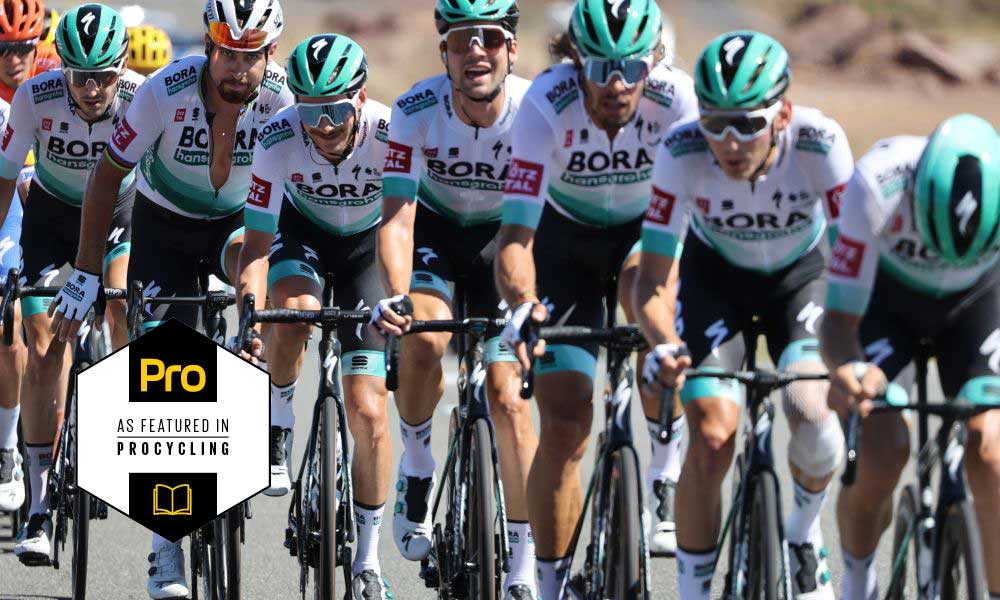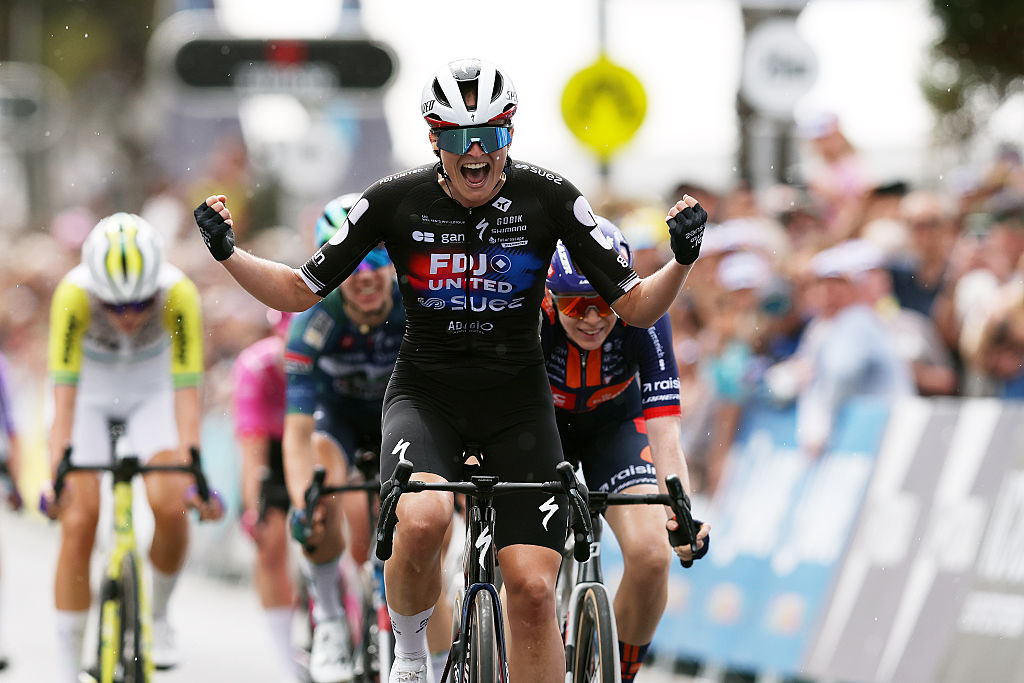Bora-Hansgrohe's evolution from Peter Sagan's team at the Tour de France
Lennard Kämna's victory on stage 16 encapsulates newfound strength in depth

When Peter Sagan signed for Bora-Hansgrohe in 2017 everything changed for what had up until then been a modestly run German ProConti squad. The team moved up to the WorldTour and became the Peter Sagan show.
The profile of the then two-time world champion (he’d win the rainbow stripes again in his first year with the team) couldn’t have been higher; when Sagan’s signing was confirmed on August 1 2016, it came in a season where he won a debut monument at the Tour of Flanders and a week after a hat-trick of stage wins at the Tour de France, including another green jersey.
Their first season together, Sagan won 11 times - a third of the team’s 33 victories that year. Any race you’d go to where Sagan was on the startline, the swarming crowd around the Bora bus told you all you needed to know.
Fast forward three years and although Sagan is still a superstar in cycling, his Bora team is far from the one-man show as it was when he first joined. In fact, with five stages to go in the 2020 Tour, the only sure success for the team comes in the form of young Lennard Kämna’s solo victory on stage 16, in Villard-de-Lans. Sagan currently sits empty handed.
In the Tours from 2017 until now, Sagan has dominated for Bora. He’s won five of their six stages before this year - with Maciej Bodnar adding the other on the stage 20 time trial in 2017. There’s also the fact that every year since 2012 Sagan has stood on the podium in Paris wearing green, the only exception being in 2017 when he was controversially disqualified early in the race. Sagan and his hybrid riding abilities have changed the face of what traditionally was the sprinters’ competition.
Yet with five days to go he’s trailing Sam Bennett by 45 points, and on the back foot in a competition he’s up to now made his own. The sight of the Slovak riding around with Bennett stuck to his wheel in the early kilometres of stage 16, like a bit of chewing gum on his shoe, showed just how hard it’ll be for him to sweep up any upcoming intermediate sprint points to close the deficit in the race’s remaining five days.
But while Sagan has been hogging the headlines, quietly in the wings Bora have been signing and developing a crop of young German riders who encapsulate the future of the team. Kämna, 24, is the youngest of the trio of home talent on the Bora Tour roster, alongside Emanuel Buchmann, 27, and Max Schachmann, 26, while sprinter Pascal Ackermann, 26, has been busy winning two stages at the concurrently running Tirreno-Adriatico.
The latest race content, interviews, features, reviews and expert buying guides, direct to your inbox!
Buchmann was due to challenge in the GC this year, and will no doubt be feeling disappointed about how this year’s Tour has unfolded having been the breakthrough star at the Tour last year, finishing fourth in Paris. Still, he can take some comfort from the fact that his performance in the mountains, where he’s been entirely absent, is the result of a crash at the Critérium du Dauphiné just a few weeks before the grand départ rather than poor form - he slipped down to 33rd place after stage 15.
With Buchmann off the pace, climbers such as Kämna and Schachmann have been given freedom to roam, and the two have proved among the most active and threatening riders all Tour.
On stage 9, Kämna escaped in the early breakaway before the GC riders reeled them back in. On stage 12, Schachmann tried his luck, and was one of the instigators of the group that Marc Hirschi went on to attack - and win - from. Schachmann finished sixth. A day later, both riders escaped on the roads to the Pas de Peyrol, but despite having the numerical advantage, and having done much of the work to keep the 17-rider group away, they ran out of legs on the final climb to the line and had to settle for second and third behind EF Pro Cycling’s Dani Martínez. Again, they went on, with Kämna putting in a little dig inside the final kilometres of stage 13, before being reeled in.
Finally, on stage 16, Kämna got the team a victory after a dogged performance that saw him drop Richard Carapaz and Sébastien Reichenbach, the last remnants of the breakaway and despite the pair having first dropped him, to solo to the line almost 90 seconds clear. It’s only his second pro victory ever, with the first having come just a few weeks ago in similar style on stage 4 of the Dauphiné.
In riders such as Kämna, Schachmann, Buchmann and Ackermann, Bora now has strength in depth they didn’t four years ago when they joined the WorldTour. Buchmann has developed through their ranks, having been talent-spotted and signed in 2015. Schachmann and Kämna have proved canny signings, with manager Ralph Denk snapping both up from Quick Step and Sunweb in the last two years. Schachmann, in this form, will head straight to the Ardennes classics next as one of the favourites for a victory.
Ackermann, meanwhile, was a little known young sprinter when he joined the team at the same time as Sagan. Since 2018, he’s brought in 28 victories - including stage wins at the Giro d’Italia - more than any other rider on the team. It seems only a matter of time before he makes his Tour de France debut.
As for Peter Sagan. He has five stages to turn his Tour into a success, before he goes home and refocuses on his debut at the Giro d’Italia. The five-year contract he signed in 2017 is up at the end of next season. Whether he plans to re-sign, move elsewhere, or retire altogether - as he has hinted in the past - remains unknown. One thing is known, is that the Bora-Hansgrohe team, whenever he leaves, are now major players in the WorldTour, and is definitely not the same team as the one Sagan joined in 2017.
Sophie Hurcom is Procycling's deputy editor
If you like what you read, why not subscribe to Procycling magazine? As part of our autumn sale, a subscription currently starts at just £5 for the first five issues - that’s only £1 per issue. Procycling magazine, the best writing and photography from inside the world’s toughest sport.
Sophie Hurcom is Procycling’s deputy editor. She joined the magazine in 2017, after working at Cycling Weekly where she started on work experience before becoming a sub editor, and then news and features writer. Prior to that, she graduated from City University London with a Masters degree in magazine journalism. Sophie has since reported from races all over the world, including multiple Tours de France, where she was thrown in at the deep end by making her race debut in 2014 on the stage that Chris Froome crashed out on the Roubaix cobbles.
